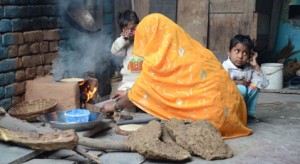A new Word Bank report looks at new innovations in advanced biomass cookstoves, and examines new approaches that might be used to address the environmental, health and climate issues associated with traditional biomass stoves.
The report identifies a combination of critical factors that could be “game changers” in providing safe and clean household energy to the poorest people of the developing world. These potential “game changers” include:
- Taking advantage of opportunities for technology development, leading to the availability of “advanced” biomass stoves—some of these stoves could be as clean burning as natural gas stoves, according to Prof. Kirk Smith of the University of California at Berkeley, who has been researching cookstoves and indoor air pollution for the past 30 years;
- Utilizing new sources and mechanisms of financing, including those linked to climate change; and
- Supporting the formation of new international coalitions and global partnerships like the UN Foundation-led Global Alliance for Clean Cookstoves which aims to spur the adoption of 100 million clean burning cookstoves by the year 2020. The World Bank Group has joined the alliance through the Energy Sector Management Assistance Program (ESMAP).
Access the full report here.
Source: World Bank, Household Cookstoves, Environment, Health, and Climate Change: A New Look at an Old Problem, 2011.



